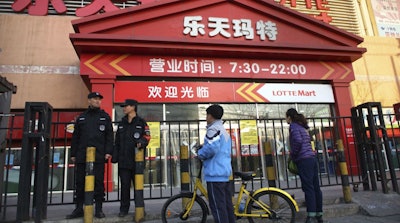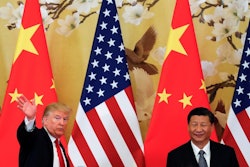
Politics weighs more heavily on foreign companies in China than it has in nearly three decades.
The latest flashpoint was Beijing's fury last week at hotel keeper Marriott and other companies that labeled self-ruled Taiwan a country on websites or customer materials. But companies face pressure on many sides from President Xi Jinping's more nationalistic stance and twin campaigns to tighten the ruling Communist Party's political control and have it play a direct role in business.
Businesspeople complain their operations are being hampered by internet disruptions due to Beijing's latest campaign since last year to tighten censorship of what the Chinese public sees online. They face pressure to promote initiatives such as helping potential Chinese rivals develop technology in fields including electric cars.
Last year, Beijing destroyed South Korean retailer Lotte's business in China after the company sold land to the Seoul government to install an anti-missile system Chinese leaders opposed.
Most disturbing for companies: Beijing is pressing them to restructure joint ventures with Chinese partners to give the ruling party a formal voice in hiring, investment and other decisions.
"Xi Jinping has taken politics to a heightened level," said James Zimmerman, managing partner in Beijing for law firm Sheppard Mullin and a former chairman of the American Chamber of Commerce in China, in an email.
Foreign companies worry the "whims of political institutions" will erode their ability to make decisions, Zimmerman wrote. "Political institutions thrive on power and a quest to maintain power tends to favor select champions at the risk of innovation and entrepreneurship."
Politics always has overshadowed China's state-dominated economy. But since Xi took power in 2012, the party has reversed its trend of loosening its control of business to encourage entrepreneurial activity that generates China's new jobs and wealth.
Leaders have sent mixed messages by promising to promote free markets while also pledging to build up state-owned companies that dominate banking, oil, telecoms and other industries.
In 2013, the party said for the first time that market forces would play the "decisive role" in allocating resources — a declaration welcomed by businesspeople. But at the same time, the party said it would take more direct control of state-owned industries in a move outsiders said might be prompted by frustration about waste and corruption.
In a December speech to its ruling Politburo, Xi called for "strengthening the party's leadership of economic work," according to the party website.
The party's main theoretical journal, Qiushi, followed up by publishing a blog post criticizing privatization of industry as a development strategy.
"Communists can sum up their theory in one sentence: eliminate private ownership," wrote Zhou Xincheng, a professor of Marxism at the party's Renmin University in Beijing.
Business groups say party members and government officials who might offer feedback that could temper the economic cost of such political initiatives feel pressure to downplay that and show their loyalty to Xi's program.
It all adds to burdens for foreign companies that face slowing Chinese economic growth and a thicket of regulatory barriers they say make them feel increasingly unwelcome.
Last week's blast of official anger at Marriott, fashion brand Zara, Delta Air Lines and medical equipment maker Medtronic reflected Beijing's more assertive foreign policy and acute sensitivity about its claim to Taiwan. Beijing has rattled the island, as well as Japan and South Korea, by sending fighter jets and bombers close to their airspace in recent months.
Marriott was forced to close its website for a week and others were ordered to apologize publicly. The official Xinhua News Agency cited a Marriott executive as saying an employee who "liked" a tweet citing the Tibet mention would be fired.
Those companies appear to have been let off relatively easily compared with Lotte.
Authorities closed most of the South Korean company's 99 supermarkets and other outlets after it sold land for the U.S.-supplied THAAD anti-missile system Beijing worried would allow American forces to see into Chinese territory.
Seoul and Beijing later mended relations but Lotte lost hundreds of millions of dollars. South Korean media say the company has given up on China and is trying to sell its stores.
Companies are feeling a broader impact from a campaign under way since last year by the party, which already controls the regulators who oversee them, to gain a formal voice in their decisions about hiring, investment and strategy.
The party is pressing foreign managers to rewrite their articles of association, the document that defines the company structure and goals, to give it board seats or an advisory position. Businesspeople complain in private the party might be to trying to create a way to steer them toward doing things that serve its goals at their expense.
This is not the first time the party has mobilized to expand its presence in a newly developing segment of the economy.
In 2006, then-party leader Hu Jintao ordered a campaign to set up labor unions at foreign employers including Wal-Mart. That succeeded, but many of the new labor bodies did so little that workers complained they were allied with management.
By contrast, the latest campaign could lead to a fundamental change in the structure and leadership of joint ventures.
The European Union Chamber of Commerce in China warned in November that if such changes take place, companies might be discouraged from investing in new joint ventures or reconsider their commitment to existing businesses.
European businesspeople say companies from some countries could face a public outcry at home due to memories of Communist Party-controlled workplaces in Soviet-era Eastern Europe.
This anxiety comes as Beijing faces mounting trade complaints from Washington and Europe.
"The belligerent tone and tack of the Trump Administration is likely going to worsen the situation and drive the Chinese leadership to be more insular and less conciliatory in the trade relationship," said Zimmerman.






















